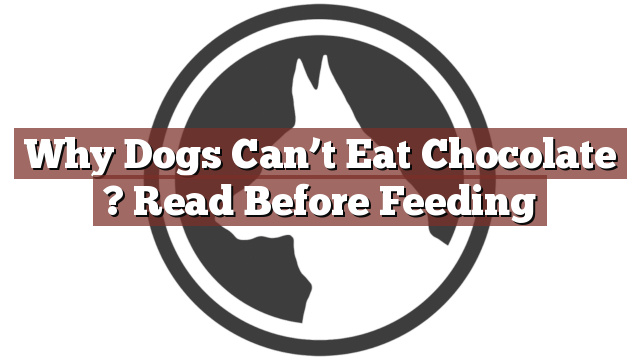Understanding Your Dog’s Dietary Needs
As dog owners, it is our responsibility to ensure that our furry companions receive a balanced and healthy diet. While we may be tempted to share our favorite treats with them, it is crucial to remember that not all human food is suitable for dogs. Understanding your dog’s dietary needs is essential to keep them happy and healthy.
A dog’s digestive system is different from ours, and their nutritional requirements vary as well. Dogs require a diet that is rich in protein, healthy fats, and carbohydrates, along with essential vitamins and minerals. Feeding them a well-balanced diet helps maintain their overall health and prevents the development of various health issues.
Why Dogs Can’t Eat Chocolate? Read Before Feeding
Now, let’s address the burning question that many dog owners have: can dogs eat chocolate? The short and straightforward answer is no. Chocolate, in any form, can be toxic and even fatal for dogs. This is due to a compound called theobromine, which is found in chocolate. While humans can metabolize theobromine effectively, dogs process it much more slowly, leading to a buildup of this toxic substance in their system.
Theobromine affects a dog’s central nervous system, cardiovascular system, and urinary system. Even a small amount of chocolate can cause symptoms like vomiting, diarrhea, increased heart rate, muscle tremors, seizures, and in severe cases, it can be life-threatening. The darker the chocolate, the higher the concentration of theobromine, making it more dangerous for our canine friends.
Pros and Cons of Feeding Chocolate to Dogs
It is crucial to understand the potential risks associated with feeding chocolate to dogs. While some dog owners may argue that their pets have consumed chocolate without any apparent harm, it is essential to remember that every dog reacts differently to toxic substances. Some dogs may have a higher tolerance for theobromine, but that does not make it safe for them.
The potential cons of feeding chocolate to dogs far outweigh any perceived benefits. The risks of chocolate toxicity can lead to severe illness or even death in dogs. Therefore, it is always best to err on the side of caution and avoid feeding chocolate to our furry friends altogether.
Conclusion: Importance of Avoiding Chocolate for Dogs
In conclusion, it is crucial for every dog owner to be well-informed about the potential dangers of feeding chocolate to their pets. While it may be tempting to share our favorite chocolate treats with them, we must resist the urge and prioritize their well-being.
Remember, the answer to the question "can dogs eat chocolate?" is a resounding no. Chocolate is toxic to dogs due to the presence of theobromine, and even a small amount can have severe consequences. It is always better to consult a veterinarian regarding appropriate and safe treats for your canine companion to ensure their overall health and happiness.
Thank you for taking the time to read through our exploration of [page_title]. As every dog lover knows, our furry friends have unique dietary needs and responses, often varying from one canine to another. This is why it's paramount to approach any changes in their diet with caution and knowledge.
Before introducing any new treats or making alterations to your dog's diet based on our insights, it's crucial to consult with a veterinarian about [page_title]. Their expertise ensures that the choices you make are well-suited to your particular pet's health and well-being.
Even seemingly harmless foods can sometimes lead to allergic reactions or digestive issues, which is why monitoring your dog after introducing any new food item is essential.
The content provided here on [page_title] is crafted with care, thorough research, and a genuine love for dogs. Nevertheless, it serves as a general guideline and should not be considered a substitute for professional veterinary advice.
Always prioritize the expert insights of your veterinarian, and remember that the health and happiness of your furry companion come first.
May your journey with your pet continue to be filled with joy, love, and safe culinary adventures. Happy reading, and even happier snacking for your canine friend!

